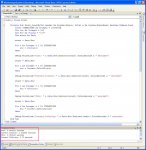skaryChinezeGuie
Well-known member
- Joined
- Apr 23, 2006
- Messages
- 94
- Programming Experience
- Beginner
the problem is that option strict won't allow string to integer conversion. How can i work around this or fix it? thanks in advance.
VB.NET:
[SIZE=2][COLOR=#0000ff]Private[/COLOR][/SIZE][SIZE=2][COLOR=#0000ff]Sub[/COLOR][/SIZE][SIZE=2] BtnDeposit_Click([/SIZE][SIZE=2][COLOR=#0000ff]ByVal[/COLOR][/SIZE][SIZE=2] sender [/SIZE][SIZE=2][COLOR=#0000ff]As[/COLOR][/SIZE][SIZE=2] System.Object, [/SIZE][SIZE=2][COLOR=#0000ff]ByVal[/COLOR][/SIZE][SIZE=2] e [/SIZE][SIZE=2][COLOR=#0000ff]As[/COLOR][/SIZE]
[SIZE=2][COLOR=#0000ff]Dim[/COLOR][/SIZE][SIZE=2] myMoney [/SIZE][SIZE=2][COLOR=#0000ff]As[/COLOR][/SIZE][SIZE=2][COLOR=#0000ff]Integer[/COLOR][/SIZE][SIZE=2] = Money
[/SIZE][SIZE=2][COLOR=#0000ff]Dim[/COLOR][/SIZE][SIZE=2] myBank [/SIZE][SIZE=2][COLOR=#0000ff]As[/COLOR][/SIZE][SIZE=2][COLOR=#0000ff]Integer[/COLOR][/SIZE][SIZE=2] = Bank
[/SIZE][SIZE=2][COLOR=#0000ff]Dim[/COLOR][/SIZE][SIZE=2] DepositAmount [/SIZE][SIZE=2][COLOR=#0000ff]As[/COLOR][/SIZE][SIZE=2][COLOR=#0000ff]Integer[/COLOR][/SIZE][SIZE=2] = [B][I][U][COLOR=red]TxtDeposit.Text[/COLOR][/U][/I][/B]
[/SIZE]
[SIZE=2][COLOR=#0000ff]If[/COLOR][/SIZE][SIZE=2] DepositAmount <= myMoney [/SIZE][SIZE=2][COLOR=#0000ff]Then
[/COLOR][/SIZE][SIZE=2]Bank = myBank + DepositAmount
Money = myMoney - DepositAmount
[/SIZE][SIZE=2][COLOR=#0000ff]Call[/COLOR][/SIZE][SIZE=2] FrmBank_Load([/SIZE][SIZE=2][COLOR=#0000ff]Me[/COLOR][/SIZE][SIZE=2], [/SIZE][SIZE=2][COLOR=#0000ff]New[/COLOR][/SIZE][SIZE=2] System.EventArgs)
[/SIZE][SIZE=2][COLOR=#0000ff]Else
[/COLOR][/SIZE][SIZE=2]MessageBox.Show("Try Again")
[/SIZE][SIZE=2][COLOR=#0000ff]End[/COLOR][/SIZE][SIZE=2][COLOR=#0000ff]If
[/COLOR][/SIZE][SIZE=2][COLOR=#0000ff]End[/COLOR][/SIZE][SIZE=2][COLOR=#0000ff]Sub
[/COLOR][/SIZE]
[SIZE=2][COLOR=#0000ff]Private[/COLOR][/SIZE][SIZE=2][COLOR=#0000ff]Sub[/COLOR][/SIZE][SIZE=2] BtnWithdraw_Click([/SIZE][SIZE=2][COLOR=#0000ff]ByVal[/COLOR][/SIZE][SIZE=2] sender [/SIZE][SIZE=2][COLOR=#0000ff]As[/COLOR][/SIZE][SIZE=2] System.Object, [/SIZE][SIZE=2][COLOR=#0000ff]ByVal[/COLOR][/SIZE][SIZE=2] e [/SIZE][SIZE=2][COLOR=#0000ff]As[/COLOR][/SIZE]
[SIZE=2][COLOR=#0000ff]Dim[/COLOR][/SIZE][SIZE=2] myMoney2 [/SIZE][SIZE=2][COLOR=#0000ff]As[/COLOR][/SIZE][SIZE=2][COLOR=#0000ff]Integer[/COLOR][/SIZE][SIZE=2] = Money
[/SIZE][SIZE=2][COLOR=#0000ff]Dim[/COLOR][/SIZE][SIZE=2] myBank2 [/SIZE][SIZE=2][COLOR=#0000ff]As[/COLOR][/SIZE][SIZE=2][COLOR=#0000ff]Integer[/COLOR][/SIZE][SIZE=2] = Bank
[/SIZE][SIZE=2][COLOR=#0000ff]Dim[/COLOR][/SIZE][SIZE=2] WithdrawAmount [/SIZE][SIZE=2][COLOR=#0000ff]As[/COLOR][/SIZE][SIZE=2][COLOR=#0000ff]Integer[/COLOR][/SIZE][SIZE=2] = [B][I][U][COLOR=red]TxtWithdraw.Text[/COLOR][/U][/I][/B]
[/SIZE]
[SIZE=2][COLOR=#0000ff]If[/COLOR][/SIZE][SIZE=2] WithdrawAmount <= myBank2 [/SIZE][SIZE=2][COLOR=#0000ff]Then
[/COLOR][/SIZE][SIZE=2]Bank = myBank2 - WithdrawAmount
Money = myMoney2 + WithdrawAmount
[/SIZE][SIZE=2][COLOR=#0000ff]Call[/COLOR][/SIZE][SIZE=2] FrmBank_Load([/SIZE][SIZE=2][COLOR=#0000ff]Me[/COLOR][/SIZE][SIZE=2], [/SIZE][SIZE=2][COLOR=#0000ff]New[/COLOR][/SIZE][SIZE=2] System.EventArgs)
[/SIZE][SIZE=2][COLOR=#0000ff]Else
[/COLOR][/SIZE][SIZE=2]MessageBox.Show("Try Again")
[/SIZE][SIZE=2][COLOR=#0000ff]End[/COLOR][/SIZE][SIZE=2][COLOR=#0000ff]If
[/COLOR][/SIZE][SIZE=2][COLOR=#0000ff]End[/COLOR][/SIZE][SIZE=2][COLOR=#0000ff]Sub
[/COLOR][/SIZE]
Last edited by a moderator:

